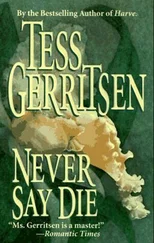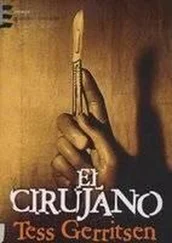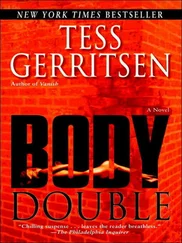“No. I’m as shocked as everyone else here. Dr. Welliver seemed perfectly fine to me. The only thing different today is that she didn’t come down to dinner.”
“And the last time you saw her?”
“At lunchtime. I believe she had her last student appointment of the day at one o’clock. No one saw her after that. Until she jumped.”
“Do you have any theories? Any idea why she’d do this?”
“Absolutely none. We’re all baffled.”
“Well,” the woman said, “if an expert like Dr. Isles is in the dark, then we’ve really got a mystery.” She pulled on a pair of latex gloves. “Detective Holland told me there was a witness.”
“One of the students saw it happen.”
“Oh God. That’ll give the kid nightmares.”
As if Claire Ward didn’t already have her share of them, thought Maura.
Dr. Owen looked up at the building, the windows lit up against the night sky. “Wow. I’ve never been out here before. I didn’t even know this school existed. It looks like a castle.”
“Built in the nineteenth century as a railroad baron’s estate. Judging by the Gothic architecture, I think he fancied himself as royalty.”
“Do you know where she jumped from?”
“The roof walk. It leads off the turret, where her office is located.”
Dr. Owen stared up at the turret, where Welliver’s office lights were still shining. “That looks like it’s about seventy feet, maybe even higher. What do you think, Dr. Isles?”
“I’d agree.”
As they followed the path around the side of the building, Maura wondered when she’d assumed the role of Senior Authority, a status made apparent whenever the young woman addressed her as Dr. Isles . Up ahead were the flashlight beams of the two Maine State Police detectives. The body lying at their feet was covered with a plastic sheet.
“Evening, gentlemen,” said Dr. Owen.
“Ain’t it always the shrinks who do this sort of thing?” one of the detectives said.
“She was a shrink?”
“Dr. Welliver was the school psychologist,” said Maura.
The detective grunted. “As I was saying. I guess there’s a reason they choose the field.”
As Dr. Owen lifted up the sheet, both cops aimed their flashlights to illuminate the body. Anna Welliver lay on her back, face exposed to the glare, her hair splayed about her head like a wiry gray nest. Maura glanced up at the third-floor dormitory windows and saw the silhouettes of students staring down at a sight that children should never have to see.
“Dr. Isles?” Dr. Owen offered Maura a pair of gloves. “If you’d like to join me.”
It was an invitation Maura didn’t particularly welcome, but she pulled on the gloves and crouched down beside her younger colleague. Together they palpated the skull, examined the limbs, tallied up the obvious fractures.
“All we want to know is: accident or suicide?” said one of the detectives.
“You’ve already ruled out homicide, have you?” said Dr. Owen.
He nodded. “We talked to the witness. Girl named Claire Ward, age thirteen. She was outside, standing right here when it happened, and she didn’t see anyone else on the roof but the victim. Said the woman spread her arms and took a dive.” He pointed up toward the brightly lit turret. “The door leading from her office was wide open, and we saw no signs of a struggle. She stepped out onto the roof walk, climbed over the railing, and jumped.”
“Why?”
The detective shrugged. “That I’ll leave to the shrinks. The ones who haven’t jumped.”
Dr. Owen quickly rose back to her feet, but Maura felt her own age as she stood up more slowly, her right knee stiff from too many summers of gardening, from four decades of inevitable wear and tear on tendons and cartilage. It was yet another creaky reminder that a new generation always stood waiting in the wings.
“So, based on what the witness told you,” said Dr. Owen, “this doesn’t sound like an accidental death.”
“Unless she accidentally climbed over the railing and accidentally flung herself off the roof.”
“Okay.” Dr. Owen stripped off her gloves. “I have to agree. Manner of death is suicide.”
“Except we never saw it coming,” said Maura. “There was no warning at all.”
In the dark, she could not see the expressions of the two cops, but could imagine them both rolling their eyes.
“You want a suicide note?” one detective said.
“I want a reason. I knew the woman.”
“Wives think they know their husbands. And parents know their kids.”
“Yes, I hear the same thing all the time after suicides. We had no warning . I’m fully aware that families are sometimes clueless. But this …” Maura paused, aware of three pairs of eyes watching her, the distinguished ME from Boston, trying to defend something as illogical as a hunch. “You have to understand, Dr. Welliver’s job was to counsel damaged children. To help them heal after severe emotional trauma. It was her life’s work, so why would she traumatize them further by making them see this? By dying in such a spectacular way?”
“Do you have an answer?”
“No, I don’t. Neither do her colleagues. No one on the faculty or staff understands this.”
“Next of kin?” asked Dr. Owen. “Anyone who might provide insight?”
“She was a widow. As far as Headmaster Baum knows, she has no family left.”
“Then I’m afraid it’s just one of those unknowns,” said Dr. Owen.
“But I will do an autopsy, even though the cause of death seems apparent.”
Maura looked down at the body and thought: determining cause of death will be the easy part. Slice open skin, examine ruptured organs and shattered bones, and you’ll find answers. It was the questions she could not answer that troubled her. The motives, the secret torments that drove human beings to kill strangers or take their own lives.
After the last official vehicle finally left that night, Maura made her way upstairs to the faculty common room, where most of the staff had gathered. A fire was burning in the hearth, but no one had turned on any of the lamps, as if none of them could bear any bright light on this tragic night. Maura sank into a velvet armchair and watched firelight flicker on the faces. She heard a soft clink as Gottfried poured a glass of brandy. Without a word he set it down on the table beside Maura, surmising that she, too, could use a stiff drink. She gave a nod and gratefully took a sip.
“Someone here must have a clue why she did it,” said Lily. “There had to be some sign, something we didn’t realize was significant.”
Gottfried said: “We can’t check her emails because I don’t have her password. But the police searched her personal effects, looking for a suicide note. Nothing. I spoke to the cook, the gardener, and they saw nothing of significance, not a single sign that Anna was suicidal.”
“I saw her in the garden this morning, snipping roses for her desk,” said Lily “Does that sound like something a suicidal woman would do?”
“How would we know?” Dr. Pasquantonio muttered. “ She was the psychologist.”
Gottfried looked around the room at his colleagues. “You’ve all spoken to the students. Do any of them have an answer?”
“No one,” said Karla Duplessis, the literature teacher. “She had four student sessions scheduled today. Arthur Toombs was her last appointment, at one P.M., and he said she seemed a little distracted, but nothing else. The children are as bewildered as we are. If you think this is difficult for us, imagine how hard it is for them. Anna was tending to their emotional needs, and now they find out she was the fragile one. It makes them wonder if they can count on us. If adults are strong enough to stand by them.”
Читать дальше











